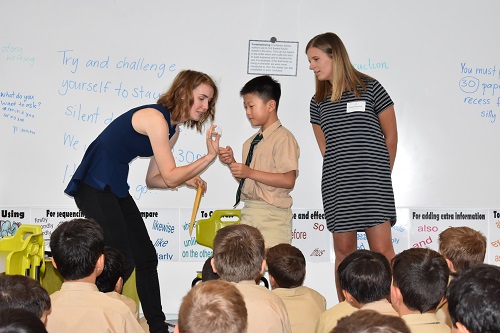
Around 800 students from Trinity Grammar School, Sydney aged from five to 12 were recently challenged to ‘shut-up’ and remain silent for up to an entire school day.
For the fourth year running, the students from the Preparatory and Junior School campuses took part in Day Without Speech – a fundraising event in support of a programme to bring speech therapy to Cambodians.
The combined total contributed over the last four years is over $67,000.
“I can only imagine how hard it must be to not speak for the rest of your life, that’s why I am so glad that my school raised enough money to help train speech therapists in Cambodia,” Junior School Year 4 student, George Drivas, said.
By participating in the challenge, students learned valuable lessons about the reliance on and necessity for communication.
The practical exercise helped boys felt empathy for those who do not have the gift of speech, having experienced first-hand the difficulty in making themselves understood when they were unable to use their voices
Trinity Grammar Preparatory School teacher, Mark Gannon, lauded how the boys used their creativity in finding ways to both express themselves and make themselves understood.
“It is a really difficult task to ask energetic young boys to do, and some words may have been uttered here and there by accident, but overall I’m very proud of the boys’ efforts and the insights they’ve gained,” Gannon said.
‘A good challenge for a good cause’
Year 6 students, Noah Ming and Kavan Meegamuge echoed these comments.
“A thing I found difficult is that I was always tempted to talk to my friends after instructions. However, I enjoyed a good challenge to face, especially for a good cause,” said Noah.
“The hardest part was remembering we can't speak because I had a lot of things that I wanted to say but I couldn't,” Kavan added.
Students were encouraged to communicate by using small whiteboards which they each carried around, hand gestures, facial expressions and even technology, instead of their voices.
Funds raised from the challenge will support OIC Cambodia’s work to build speech therapy as a profession in Cambodia.
Based in Phnom Penh, OIC’s aim is to make speech therapy available to all who need it in the country. The organisation has a long-term plan and an exit strategy – to have 100 Cambodian speech therapists employed by the government by 2030.
‘Valuable lessons for students’
At the end of the Day Without Speech challenge, Junior School teachers and OIC facilitators had debriefing sessions with students to discuss and reflect on their experience.
They discussed the impact those with communication difficulties face and learned about communication methods that can better include those with difficulties and disabilities, promoting a more inclusive school environment.
“After this experience I now no longer take speaking for granted and think about the people who aren't as lucky as me and can't speak for the whole or part of their life,” said Callum Padman from Year 6.
Hannah Craggs, Campaign Lead for Day Without Speech at OIC Cambodia, said more than 600,000 or one in 25 people in Cambodia, many of them children, have a speaking or swallowing disability, which impacts them physically, mentally and socially.
“We have over 7,500 speech therapists in Australia, but in Cambodia there is not one Cambodian university-trained speech therapist. There are no government policies addressing the issue, and very little awareness of the issue,” Craggs said
Trinity Grammar Junior School teacher, Craig Hassall, said the event is “a great cause that teaches our boys some valuable lessons”.
“While we could talk about the complications faced by Cambodian children with speaking difficulties, there is nothing like putting students in their shoes and having them experience just some of the frustrations that the Cambodian children face each and every day,” Hassall said.


